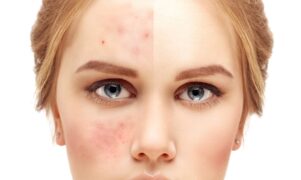Enclomiphene Citrate is a treatment for hormone-associated conditions, especially in men. It belongs to selective estrogen receptor modulators (SERMs), which work by blocking certain estrogen receptors. This movement stimulates the production of hormones like luteinizing hormone (LH) and follicle-stimulating hormone (FSH), essential for testosterone manufacturing.
People take Enclomiphene for hormone replacement therapy (HRT) or to deal with problems related to low testosterone. However, one query that comes up is whether or not Enclomiphene might improve skin fitness. Here, we find out the capability blessings—and risks—of Enclomiphene Citrate for complexion and skin.
Mechanism of Enclomiphene Citrate and Its Effects on Hormones
Enclomiphene Citrate works by blocking estrogen receptors, particularly in the brain. This causes the body to think that estrogen stages are low, prompting the production of LH and FSH. These hormones, in turn, increase the body’s testosterone levels naturally. Because of this mechanism, guys inquisitive about testosterone-boosting remedies look to buy Enclomiphene for sale to grow their testosterone ranges while avoiding the direct creation of artificial hormones.
Hormones like testosterone and estrogen notably impact skin fitness. Testosterone tends to grow oil production, which may enhance skin hydration, however, may cause more acne in some individuals. Meanwhile, estrogen plays a position in collagen production, affecting skin elasticity and smoothness. By modulating these hormone ranges, Enclomiphene Citrate may affect various aspects of skin quality.
Potential Skin Benefits of Enclomiphene Citrate
Enclomiphene’s effect on testosterone levels provides indirect benefits to the skin. Increased testosterone can cause better skin hydration and elasticity, likely resulting in a smoother, youthful complexion. Some users report that after starting Enclomiphene, they notice skin that feels firmer and looks healthier.
Reducing estrogen levels through Enclomiphene may also help address issues like hyperpigmentation. Excessive estrogen is sometimes linked to conditions like melasma, a type of skin discoloration. By balancing out estrogen, Enclomiphene may help manage these skin concerns. Additionally, the hormone balance that Enclomiphene provides may have antioxidant-like effects, helping to neutralize harmful free radicals that can age the skin over time.
Potential Adverse Skin Effects
While Enclomiphene Citrate can have positive skin effects, it may also cause adverse reactions for some people. Increased testosterone often boosts oil production, which, while hydrating for the skin, may lead to clogged pores and acne. This effect is especially notable in those already prone to acne.
On the other hand, some individuals report skin dryness, as fluctuating hormones can sometimes disrupt skin hydration. This dryness may be more common during the initial stages of therapy as the body adjusts to hormonal changes. Other side effects, such as mild skin sensitivity or hair thinning, may also arise, although these are relatively rare.
Enclomiphene Citrate vs. Traditional HRT: A Skin Comparison
Compared to traditional testosterone replacement therapy (TRT), Enclomiphene may offer certain advantages for skin health. While TRT introduces synthetic testosterone directly into the body, Enclomiphene naturally stimulates the body’s own testosterone production. This approach is often seen as gentler, potentially leading to fewer skin issues like acne or dryness.
For those concerned with the skin-related side effects of TRT, Enclomiphene Citrate may be a better option. It allows for a balanced hormone increase without introducing too much testosterone too quickly, which can sometimes overwhelm the skin.
Real-World Experiences and Research Findings
While formal research on Enclomiphene’s effects on skin health is limited, anecdotal evidence provides some insight. Many men report skin improvements when using Enclomiphene Citrate, including reduced skin oiliness and firmer texture. Some users say they noticed fewer wrinkles and fine lines as testosterone levels rose. However, others mention experiencing increased acne, especially at higher doses.
Research has yet to confirm whether these skin benefits are consistent across all users. Still, early evidence suggests that Enclomiphene’s effects on the skin vary by individual, depending largely on baseline hormone levels and skin type.
Practical Considerations and Recommendations
For those considering Enclomiphene primarily for skin benefits, several factors should be kept in mind. Ideal candidates are those with low testosterone levels who experience skin concerns related to hormone imbalance, such as dry skin or mild hyperpigmentation. Consulting a healthcare provider is essential, as they can recommend an appropriate dosage and monitor hormone levels to track skin effects. Always buy SARMs for reputable suppliers like BehemothLabz.
Users should also consider potential side effects and discuss these with a healthcare professional. Alternative skin treatments, such as retinoids or antioxidants, may also be suggested alongside Enclomiphene for comprehensive skin care.
Conclusion
Enclomiphene Citrate’s impact on skin health remains an interesting, though secondary, effect of the medication. While its primary purpose is to boost testosterone, the associated hormone balance can lead to skin changes that many users see as beneficial. Increased hydration, improved elasticity, and reduced pigmentation are potential positives, but acne and dryness remain possible drawbacks.
For anyone interested in Enclomiphene for skin health, medical advice and regular monitoring are recommended to achieve optimal results safely. While not a guaranteed skin treatment, Enclomiphene Citrate’s benefits make it a compelling option for those looking to enhance skin health alongside hormonal support.

Comments